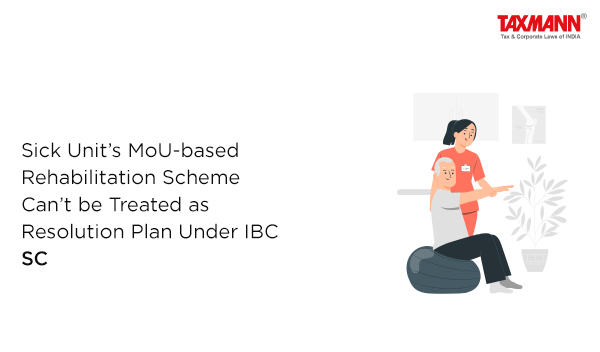Sick Unit’s MoU-based Rehabilitation Scheme Can’t be Treated as Resolution Plan Under IBC | SC
- Blog|News|Insolvency and Bankruptcy Code|
- 2 Min Read
- By Taxmann
- |
- Last Updated on 3 October, 2023

Case Details: Pramod Kumar Pathak v. Arfat Petrochemicals (P.) Ltd. - [2023] 154 taxmann.com 635 (SC)
Judiciary and Counsel Details
-
- Sanjiv Khanna & S.V.N. Bhatti, JJ.
- Pankaj Jain, Sarthak Dugar, Yajur Bhalla, Vishnu Kant Pandey, Rohan Chanda, Anchita Nayyar, Advs. & Shubham Bhalla, AOR for the Petitioner.
- Arvind Kumar Gupta, Ms Purti Gupta, Ms Henna George, Advs. & Ms Henna George, AOR for the Respondent.
Facts of the Case
In the instant case, the corporate debtor ‘JK’ was declared a sick industrial unit by the Board of Industrial and Financial Reconstruction (BIFR). JK entered into an MoU with the respondent, on the basis of which, the implementation of the rehabilitation scheme was approved by the Appellate Authority for Industrial & Financial Reconstruction (AAIFR).
The appellant claiming to be a representative of the workmen’s union filed an application under section 33 of the IBC contending that the rehabilitation scheme was a resolution plan within the meaning of the IBC and claimed that an order of liquidation be passed against the corporate debtor for breach of the said scheme.
However, the Adjudicating Authority (NCLT) rejected the application of the appellant. The appellant assailed the said order in appeal before the NCLAT relying on Notification No. S.O. 1638(E), dated 24-5-2017.
However, the same was rejected vide the impugned order in view of the judgment in Spartek Ceramics India Ltd. v. Union of India [2019] 111 taxmann.com 535 holding that the said notification travelled beyond the scope of removal of difficulties provisions thus approved rehabilitation scheme could not be treated as a resolution plan within the meaning of IBC.
Supreme Court Held
The Supreme Court held that in view of the judgment of the instant court in the case of Spartek Ceramics (Supra), the NCLAT rightly held that the said notification would not confer and give jurisdiction to Tribunal to decide the issue raised by the appellant. Therefore, the instant appeal was to be dismissed.
Disclaimer: The content/information published on the website is only for general information of the user and shall not be construed as legal advice. While the Taxmann has exercised reasonable efforts to ensure the veracity of information/content published, Taxmann shall be under no liability in any manner whatsoever for incorrect information, if any.

Taxmann Publications has a dedicated in-house Research & Editorial Team. This team consists of a team of Chartered Accountants, Company Secretaries, and Lawyers. This team works under the guidance and supervision of editor-in-chief Mr Rakesh Bhargava.
The Research and Editorial Team is responsible for developing reliable and accurate content for the readers. The team follows the six-sigma approach to achieve the benchmark of zero error in its publications and research platforms. The team ensures that the following publication guidelines are thoroughly followed while developing the content:
- The statutory material is obtained only from the authorized and reliable sources
- All the latest developments in the judicial and legislative fields are covered
- Prepare the analytical write-ups on current, controversial, and important issues to help the readers to understand the concept and its implications
- Every content published by Taxmann is complete, accurate and lucid
- All evidence-based statements are supported with proper reference to Section, Circular No., Notification No. or citations
- The golden rules of grammar, style and consistency are thoroughly followed
- Font and size that’s easy to read and remain consistent across all imprint and digital publications are applied



 CA | CS | CMA
CA | CS | CMA
